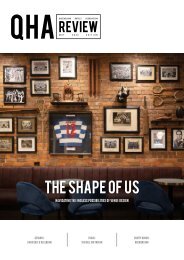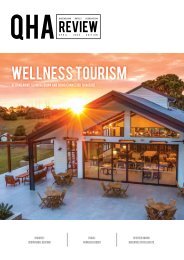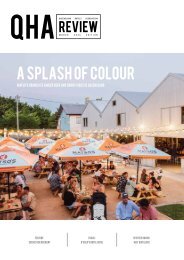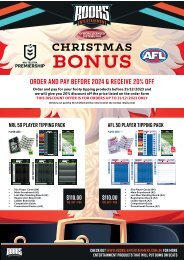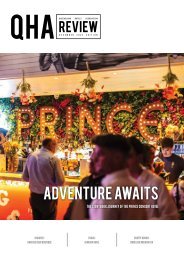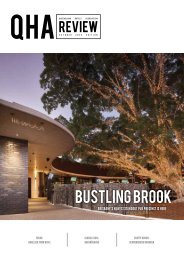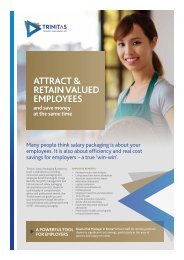QHA_Sep-2020_Online
You also want an ePaper? Increase the reach of your titles
YUMPU automatically turns print PDFs into web optimized ePapers that Google loves.
LEGAL MATTERS<br />
with Curt Schatz<br />
TIPS FOR ENTRANTS TO THE PUB & HOTEL MARKET<br />
There is no doubt that the first eight months of <strong>2020</strong> have been nothing like what we all expected when writing our<br />
New Year’s resolutions back in January. Despite the challenges and obstacles of the last few months, it has been<br />
fantastic to see the beers flowing and venues bustling again as the Queensland hospitality industry welcomes a<br />
(partial) return to normality. As a result of the staged relaxation of COVID-19 restrictions in Queensland, we have seen<br />
a gradual increase in interest in the hospitality transactional space. Hopefully we will see this continue to rise in the<br />
months ahead, and with this in mind, I thought it timely to run through some tips for new entrants to the pub and<br />
hotel market, or those well-versed veterans looking to revisit the basics.<br />
<strong>QHA</strong> REVIEW | 26<br />
What assets do you want to<br />
buy?<br />
While it may seem a simple<br />
question, it’s one that requires<br />
careful consideration. For<br />
example, combined freehold<br />
and business transactions will<br />
bring higher purchase prices,<br />
but provide additional exit and<br />
restructuring opportunities in<br />
the future (such as a sale of the<br />
freehold title, but retention of<br />
the leasehold, or vice versa).<br />
Alternatively, leasehold purchases<br />
will be cheaper, but require careful<br />
consideration in relation to leasing<br />
matters and options to renew.<br />
Both prospective buyers and<br />
sellers should consider what<br />
assets will form part of the<br />
transaction, as it is often the<br />
case that some aspects of the<br />
business (such as branding,<br />
vehicles or specific products or<br />
licences) are excluded from the<br />
sale.<br />
Who owns what?<br />
This is a common issue when<br />
dealing with long-established<br />
businesses as it is often the<br />
case that certain assets have<br />
been purchased over time, or<br />
are used in the business but are<br />
owned by or registered in the<br />
name of someone else. These<br />
inconsistencies ought to be<br />
investigated prior to listing your<br />
asset for sale, or at the very least<br />
(for purchasers) addressed in the<br />
sale agreement so that the buyer<br />
can be assured that they are able<br />
to take ownership of all necessary<br />
assets to run the venue after<br />
settlement. Importantly, these<br />
matters will often have a bearing<br />
on the tax treatment of the<br />
transaction, particularly in relation<br />
to GST.<br />
Financial information and<br />
equipment leases<br />
As a starting point for both buyers<br />
and sellers, financiers should be<br />
given as much notice as possible<br />
of any potential transaction. As<br />
with any transaction, prospective<br />
buyers should be fully aware of<br />
their financial capacity and the<br />
terms required by their financier in<br />
any potential transaction (such as<br />
director’s guarantees). For sellers,<br />
company directors should confirm<br />
whether any personal guarantees<br />
have been provided as part of<br />
the financial arrangements and<br />
ensure that they are released<br />
upon the sale of the venue.<br />
Information regarding the<br />
financial position of the business<br />
is a key preliminary detail in the<br />
transaction process. As outlined<br />
in my column in the August<br />
edition of the <strong>QHA</strong> Review,<br />
qha.org.au/curts-tips, we have<br />
seen some contracts negotiated<br />
in the midst of COVID-19 include<br />
conditions precedent, to the<br />
effect that settlement of the<br />
transaction will not be triggered<br />
until the venue sees a return to<br />
‘normalised’ turnover figures<br />
(ordinarily two consecutive<br />
months reflective of the numbers<br />
achieved 12 months prior).<br />
Careful structuring consideration<br />
needs to be given by both<br />
parties as to the ‘triggers’ for the<br />
settlement of the transaction.<br />
Business names<br />
It is important to ensure that the<br />
name of the venue has been<br />
registered with ASIC and is<br />
current. The name of the hotel<br />
and any bottle shops can make<br />
up a large component of the<br />
goodwill associated with the<br />
business so for sellers and buyers<br />
alike, it is vital to ensure that these<br />
matters are in order.<br />
Leases<br />
Quite often the terms of a hotel<br />
lease (for leasehold premises) are<br />
neglected, particularly when the<br />
landlord and tenant are related<br />
parties. Prospective sellers should<br />
look to rectify any internal leasing<br />
matters prior to going to market.<br />
Consideration should also be<br />
given to the terms and status of<br />
any detached bottle shop lease.




